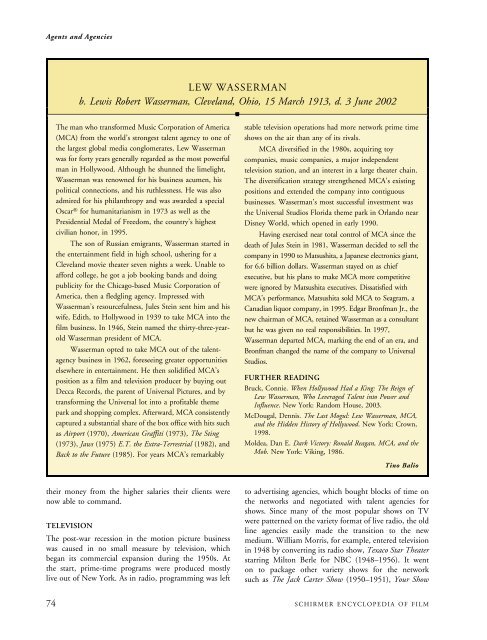Schirmer Encyclopedia of Film
Schirmer Encyclopedia of Film
Schirmer Encyclopedia of Film
You also want an ePaper? Increase the reach of your titles
YUMPU automatically turns print PDFs into web optimized ePapers that Google loves.
Agents and Agencies<br />
LEW WASSERMAN<br />
b. Lewis Robert Wasserman, Cleveland, Ohio, 15 March 1913, d. 3 June 2002<br />
The man who transformed Music Corporation <strong>of</strong> America<br />
(MCA) from the world’s strongest talent agency to one <strong>of</strong><br />
the largest global media conglomerates, Lew Wasserman<br />
was for forty years generally regarded as the most powerful<br />
man in Hollywood. Although he shunned the limelight,<br />
Wasserman was renowned for his business acumen, his<br />
political connections, and his ruthlessness. He was also<br />
admired for his philanthropy and was awarded a special<br />
OscarÒ for humanitarianism in 1973 as well as the<br />
Presidential Medal <strong>of</strong> Freedom, the country’s highest<br />
civilian honor, in 1995.<br />
The son <strong>of</strong> Russian emigrants, Wasserman started in<br />
the entertainment field in high school, ushering for a<br />
Cleveland movie theater seven nights a week. Unable to<br />
afford college, he got a job booking bands and doing<br />
publicity for the Chicago-based Music Corporation <strong>of</strong><br />
America, then a fledgling agency. Impressed with<br />
Wasserman’s resourcefulness, Jules Stein sent him and his<br />
wife, Edith, to Hollywood in 1939 to take MCA into the<br />
film business. In 1946, Stein named the thirty-three-yearold<br />
Wasserman president <strong>of</strong> MCA.<br />
Wasserman opted to take MCA out <strong>of</strong> the talentagency<br />
business in 1962, foreseeing greater opportunities<br />
elsewhere in entertainment. He then solidified MCA’s<br />
position as a film and television producer by buying out<br />
Decca Records, the parent <strong>of</strong> Universal Pictures, and by<br />
transforming the Universal lot into a pr<strong>of</strong>itable theme<br />
park and shopping complex. Afterward, MCA consistently<br />
captured a substantial share <strong>of</strong> the box <strong>of</strong>fice with hits such<br />
as Airport (1970), American Graffiti (1973), The Sting<br />
(1973), Jaws (1975) E.T. the Extra-Terrestrial (1982), and<br />
Back to the Future (1985). For years MCA’s remarkably<br />
their money from the higher salaries their clients were<br />
now able to command.<br />
TELEVISION<br />
The post-war recession in the motion picture business<br />
was caused in no small measure by television, which<br />
began its commercial expansion during the 1950s. At<br />
the start, prime-time programs were produced mostly<br />
live out <strong>of</strong> New York. As in radio, programming was left<br />
stable television operations had more network prime time<br />
shows on the air than any <strong>of</strong> its rivals.<br />
MCA diversified in the 1980s, acquiring toy<br />
companies, music companies, a major independent<br />
television station, and an interest in a large theater chain.<br />
The diversification strategy strengthened MCA’s existing<br />
positions and extended the company into contiguous<br />
businesses. Wasserman’s most successful investment was<br />
the Universal Studios Florida theme park in Orlando near<br />
Disney World, which opened in early 1990.<br />
Having exercised near total control <strong>of</strong> MCA since the<br />
death <strong>of</strong> Jules Stein in 1981, Wasserman decided to sell the<br />
company in 1990 to Matsushita, a Japanese electronics giant,<br />
for 6.6 billion dollars. Wasserman stayed on as chief<br />
executive, but his plans to make MCA more competitive<br />
were ignored by Matsushita executives. Dissatisfied with<br />
MCA’s performance, Matsushita sold MCA to Seagram, a<br />
Canadian liquor company, in 1995. Edgar Bronfman Jr., the<br />
new chairman <strong>of</strong> MCA, retained Wasserman as a consultant<br />
but he was given no real responsibilities. In 1997,<br />
Wasserman departed MCA, marking the end <strong>of</strong> an era, and<br />
Bronfman changed the name <strong>of</strong> the company to Universal<br />
Studios.<br />
FURTHER READING<br />
Bruck, Connie. When Hollywood Had a King: The Reign <strong>of</strong><br />
Lew Wasserman, Who Leveraged Talent into Power and<br />
Influence. New York: Random House, 2003.<br />
McDougal, Dennis. The Last Mogul: Lew Wasserman, MCA,<br />
and the Hidden History <strong>of</strong> Hollywood. New York: Crown,<br />
1998.<br />
Moldea, Dan E. Dark Victory: Ronald Reagan, MCA, and the<br />
Mob. New York: Viking, 1986.<br />
Tino Balio<br />
to advertising agencies, which bought blocks <strong>of</strong> time on<br />
the networks and negotiated with talent agencies for<br />
shows. Since many <strong>of</strong> the most popular shows on TV<br />
were patterned on the variety format <strong>of</strong> live radio, the old<br />
line agencies easily made the transition to the new<br />
medium. William Morris, for example, entered television<br />
in 1948 by converting its radio show, Texaco Star Theater<br />
starring Milton Berle for NBC (1948–1956). It went<br />
on to package other variety shows for the network<br />
such as The Jack Carter Show (1950–1951), Your Show<br />
74 SCHIRMER ENCYCLOPEDIA OF FILM
















